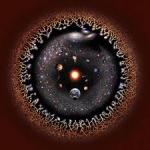Three men heard of a well in which you could see the face of God. They traveled long and far to look into this well. When they reached it, the man with the long beard looked in and was amazed.
“I saw the face of God,” he said, “and he had the most regal beard I’ve ever seen.”
Then the man with the long hair looked in. “You’re wrong,” he announced. “God has no beard, but his hair flows like water.”
The man with the head-wrap looked in. “You’re both wrong,” he thundered. “God has no beard or flowing hair but wears the finest headscarf in the world.
For millennia, humanity has tried to make sense of the mysterious cosmos in which we find ourselves. But in seeking answers, have we simply been looking into the water to find (and fight over) numerous reflections of ourselves?
The Polish science-fiction author Stanislaw Lem returned again and again to the question of what it would mean for humanity to come in contact with something truly mysterious. Would we be able to understand it? Or, in looking at what is truly unknown, would we simply project onto it our own image?
Most science-fiction assumes that we would find one way or another to communicate with another sentient, intelligent species. Once the semantics are out of the way, the plot usually jumps to the fun stuff: galactic federations, stellar wars. But Lem’s novels rarely ever get past that first step. In books like Solaris, humans spend decades studying an apparently sentient ocean on another planet with no ability to contact it, much less understand its bizarre behavior. In His Master’s Voice, scientists on Earth discover a message broadcast from the stars; the best minds work for years to decipher it and in the end fool themselves into believing they’ve cracked all its secrets.
Lem’s writing isn’t just a hypothetical exploration of contact with extraterrestrial intelligence, it also speaks to our own struggle to understand the foreignness of our universe—divinity included. If we were to receive a message from a truly metaphysical source, would we be able to understand it? Or, to paraphrase Lem, would we come to the gate, chip a few flecks of gold off the lock, and hold it up as if we’d acquired all the treasures within?
In the late 19th and 20th century, Transcendentalism, neo-Vedanta, Theosophy, and figures like Aldous Huxley popularized the notion that there exists a perennial philosophy: a single metaphysical truth which has been discovered and rediscovered by religions throughout history. According to perennialists, this truth crystalized into different religious forms according to the circumstances of each culture which discovered it. When a religion began to lose its vitality and stiffen into empty ceremonialism, mystics would reconnect with this truth and revitalize their religion—or a prophet formed a new one.
Proponents of this perspective argued that the so called “mystical” traditions of the world seemed to resemble one another and so pointed to a single metaphysical truth which all of them had access to—a fundamental Ground of being from which emerged the kernel of all faiths.
The perennialists thought this Ground was a reality external to us. But what if this Ground was the base of our own consciousness? In other words, maybe it’s not that we’re finding the same thing “out there,” it’s that when we experience the sacred—an encounter with God—we are experiencing a complete encounter with ourselves.
Carl Jung believed that psychology, the study of our inner world, is a relative late-comer in the development of human thought because we constantly externalize our psyche, projecting our inner world on the outer world and interpreting this superposition in terms of religion, mythology, and folk-belief.
This perspective is a naturalistic one and holds that the true mystery isn’t “out there” but inside us. But just because it’s within us doesn’t make it any less mysterious. Professor Jeff Kripal put it this way: we might reduce everything to the human mind, but in the end realize that the human mind is vast beyond belief. Or in Jungian terms, an encounter with God, is our conscious ego encountering its own, far vaster, Self.
To get in touch with the Self is to touch the core of all sacred experience—the place to which all mystics descend and from which all religions arise. In various ways, religions repeatedly assert that divinity lies within us. Maybe they’re right. And if we find our resemblance in the divine, maybe it’s not because we are privileged creatures made in the image of gods, but because we are coming into contact with our vast inner selves: the foundation from which all gods rise.
Subscribe to The Spiritual Naturalist Society
Learn about Membership in the Spiritual Naturalist Society
__________
The Spiritual Naturalist Society works to spread awareness of spiritual naturalism as a way of life, develop its thought and practice, and help bring together like-minded practitioners in fellowship.

















